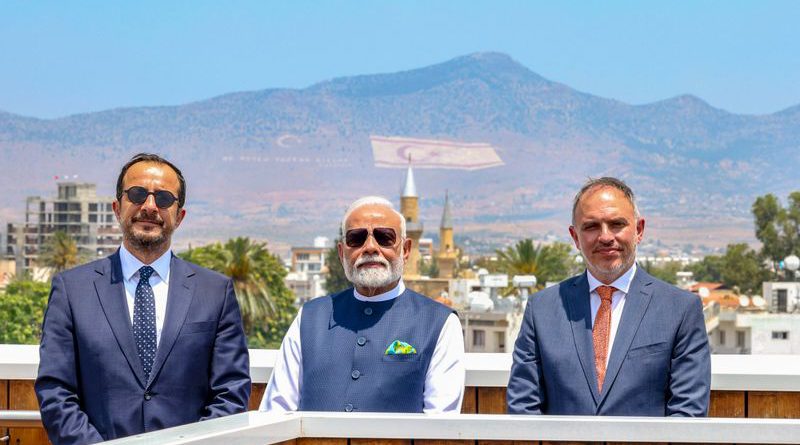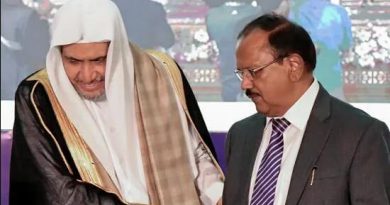OPINION: From Bharat to the Blue Waters — Modi’s Strategic Signal in Cyprus
With Cyprus assuming a leadership role in the EU soon, India has secured an empathetic voice in Brussels.
On the sun-drenched Mediterranean island of Cyprus, June 15, 2025, became more than just a summer day—it became a chapter in the shared diplomatic history between India and Europe. As Prime Minister Narendra Modi stepped onto Cypriot soil, he did not just bring the weight of protocol or policy. He brought a message: India remembers its friends, honors its partnerships, and is ready to lead on the world stage, with humility, history, and hope.
This marked the first visit by an Indian Prime Minister to Cyprus in over two decades, and yet it felt like a reunion long overdue. For Cyprus, the visit was symbolic, a nod of affirmation from one of the world’s fastest-growing powers. For India, it was an expression of gratitude, strategic foresight, and emotional bonding with a nation that has consistently stood by it on critical global matters.
A Corridor of Opportunity : India–Middle East–Europe Connectivity
One of the most significant strategic undertones of the visit was the India–Middle East–Europe Corridor (IMEC), a transformative connectivity project that aims to establish a robust trade and transport route linking India to Europe via the UAE, Saudi Arabia, Jordan, Israel, and now potentially Cyprus.
By positioning itself as a gateway into the European Union, Cyprus is not just offering India geographical access; it’s offering a launchpad for diplomacy, trade, and digital partnerships across the continent. As the European Union Council Presidency rotates to Cyprus in 2026, the timing couldn’t be more perfect. PM Modi’s presence now ensures that New Delhi has a firm handshake with Brussels, delivered via Nicosia.
At the business roundtable in Limassol, the Prime Minister emphasized the strength of India’s economy and invited Cypriot investors to explore the vast opportunities in Indian sectors such as renewable energy, shipping, pharmaceuticals, digital payments, and space technology. “
India is no longer just a big market,” Modi reportedly said. “India is a trusted partner.”
Shared Support, Shared Struggles
Beneath the smiles and state dinners, there were deeper undercurrents of shared history and mutual empathy. Cyprus has long supported India on international platforms, be it on the sensitive issue of Jammu & Kashmir, or in backing India’s legitimate aspirations for a permanent seat on the UN Security Council. It has also consistently voted in India’s favour regarding Nuclear Suppliers Group (NSG) inclusion.
PM Modi took time to publicly acknowledge and appreciate this long-standing support, reinforcing the notion that India’s diplomacy is not transactional—it is rooted in trust, tradition, and thankfulness. In a world increasingly driven by short-term alignments, this gesture stood out. It reminded observers that India does not forget those who stand by it during moments of global scrutiny.
A Diaspora Moment: Where India Meets Its Own
Perhaps the most touching segment of the visit was Modi’s interaction with the Indian diaspora in Cyprus. Hundreds of community members—professionals, students, workers, and second-generation Indian Cypriots, turned up in tricolour-themed attire, waving flags and singing patriotic songs. They didn’t just see a leader; they saw a reflection of their own identity validated on the global stage.
Modi’s words were laced with warmth. “Wherever you go, you carry a bit of Bharat with you. And today, I’ve come to carry a bit of you back to Bharat,” he told them.
It was a moment of emotional diplomacy, where national strategy meets the human spirit. The diaspora in Cyprus, though small, now feels more integrated into the larger Indian story, acknowledged and embraced by the highest office of the land.
Strategic Subtext: A Quiet Message to the Region
The timing and symbolism of the Cyprus visit also carried a geopolitical message. Turkey, which has strained ties with Cyprus and has increasingly aligned with Pakistan on the Kashmir issue, has been expanding its footprint in the Mediterranean and Islamic world. India’s outreach to Cyprus, a nation at odds with Ankara, is a calibrated balancing act.
Without naming any country, Modi’s presence underscored India’s intent to deepen friendships with democratic, pluralistic societies in sensitive geostrategic locations. It was a reminder to adversaries: India is not limited to its neighborhood; it is a global player with reach, vision, and friends across continents.
A Civilizational Connect
Beyond trade routes and policy dialogues, this visit echoed something older: a civilizational connect. Cyprus, with its ancient Greek roots, and India, the cradle of Indic civilization, have shared traditions of pluralism, tolerance, and intellectual discourse. These are not merely modern diplomatic allies, they are cultural cousins, whose stories have long intersected across history, mythology, and trade.
The two nations also share colonial pasts, movements for independence, and transitions into modern democracies. Modi’s visit, rich in cultural symbolism, reaffirmed this timeless affinity.
Looking Ahead: A Partnership for the Future
As the visit concluded, the outcomes weren’t just recorded in joint statements, they were felt in handshakes, smiles, and the hopeful eyes of young students holding the flags of two nations. Several MoUs were signed in the fields of maritime cooperation, fintech, digital infrastructure, and higher education, laying the foundation for deeper collaboration.
With Cyprus assuming a leadership role in the EU soon, India has secured an empathetic voice in Brussels. With IMEC gathering pace, Cyprus may become India’s launch point into Europe. And with cultural and diaspora ties reenergised, the two peoples are now closer than they’ve been in decades.
In Closing: More Than a Visit
This was not just another entry in a diplomatic diary. It was a statement of intent, that India, while growing into a world power, remembers the value of friendships built on respect and reciprocity. It showed that diplomacy isn’t just about signing agreements, it’s about building narratives of trust that last beyond election cycles.
Prime Minister Modi’s visit to Cyprus will be remembered not just for what it accomplished, but for how it made two nations, on opposite ends of Asia and Europe, feel a little more like neighbors.
Disclaimer: Views expressed by writers in this section are their own and do not reflect Milli Chronicle’s point-of-view.


